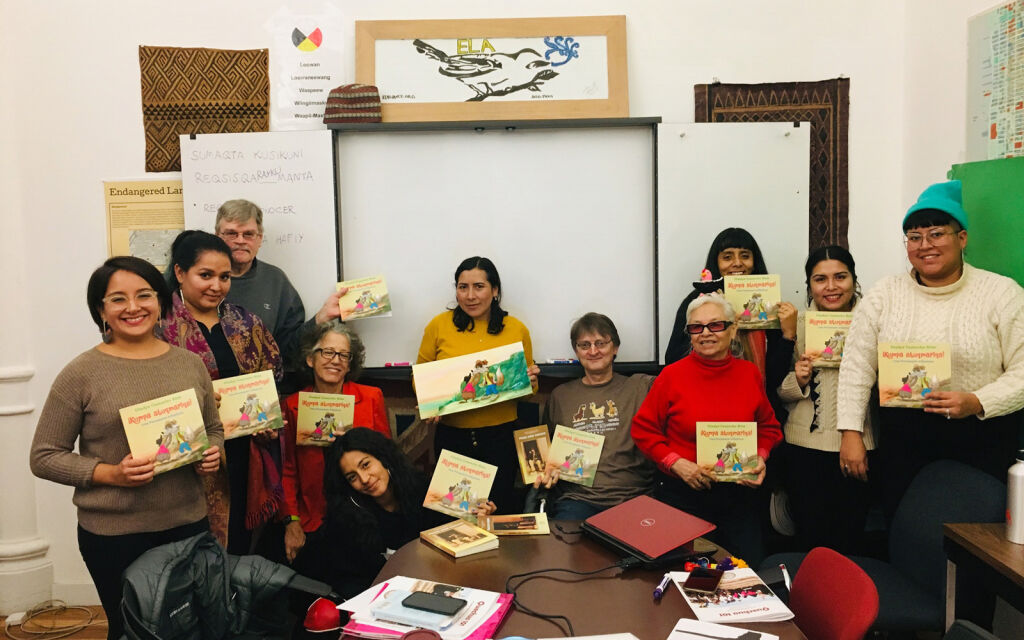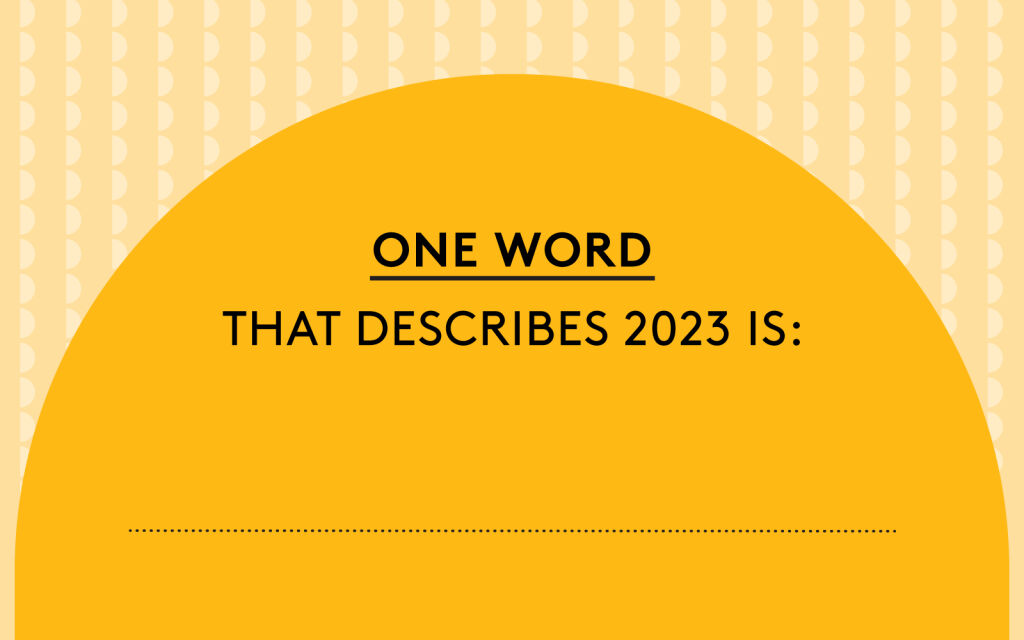When Soccer and Poetry Meet, Kids Succeed: Q&A with DC SCORES
Soccer and poetry might not seem to have much in common, but one local non-profit unites them toward a common goal: empowering kids. DC SCORES runs free, year-round soccer programs and poetry workshops for thousands of kids in the District. After building teamwork on the soccer field, they go on to perform original spoken word poetry for standing-room-only audiences in the program’s annual poetry slams. But how did such a quirky yet perfect combination come to be? DC SCORES representatives Tony Francavilla and Charity Blackwell chatted with us about the program and shared some of their favorite stories about their young poet-athletes.
How did DC SCORES get started?
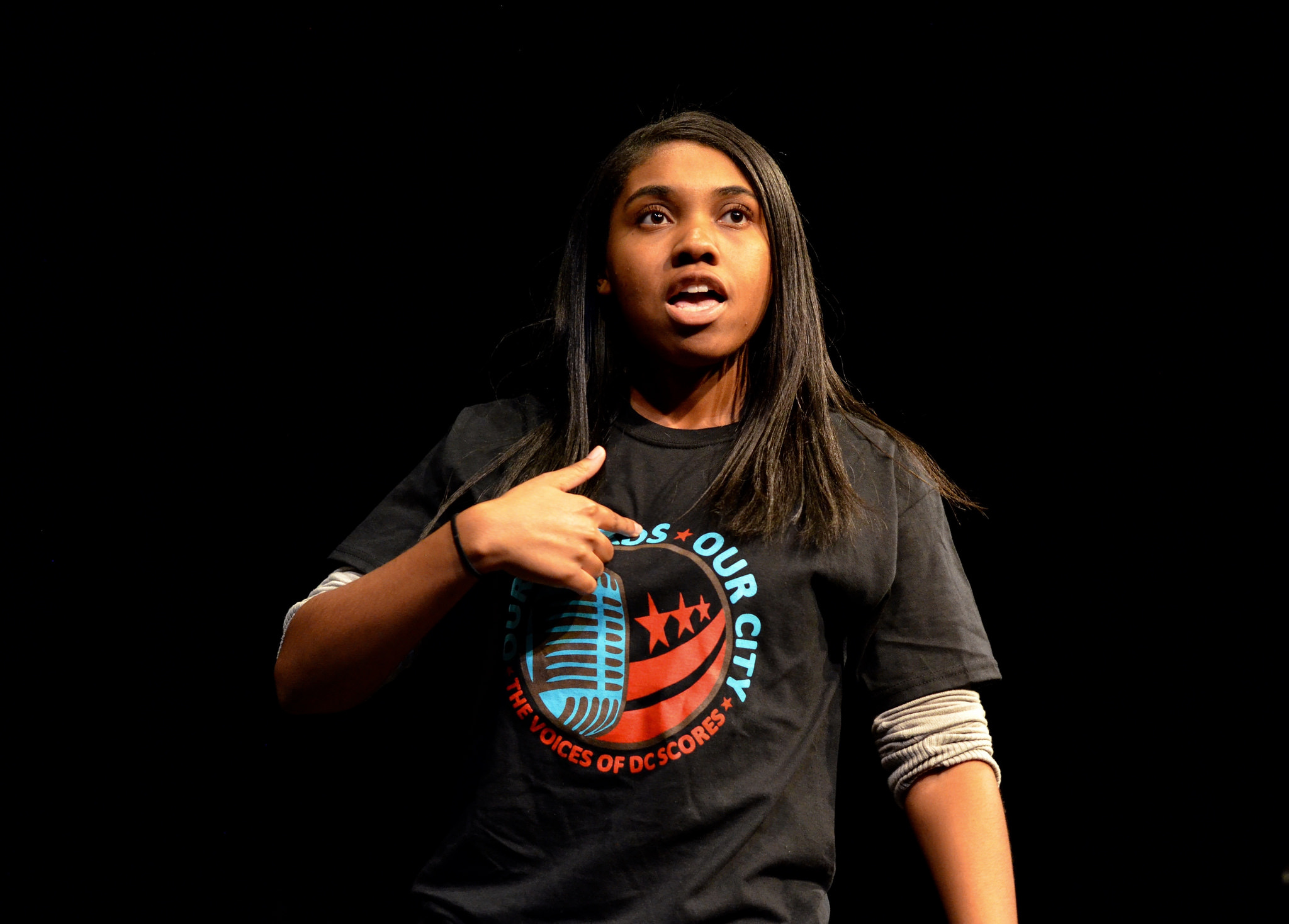
Tony: DC SCORES started in 1994 at Marie Reed Elementary School in Adams Morgan with one Teach for America teacher — her name was Julie Kennedy. She noticed that a half dozen or so of her girls were hanging out in front of the school without much to do after class. And if you would have seen Adams Morgan 23 or 24 years ago, that was not a place where anyone would ever want kids hanging around.
It so happened that she was a college soccer player, so she started working with the girls after school, teaching them the game. When the weather got bad, she had to find something for them to do inside. Her art form of choice was poetry, so they started reflecting on things in their neighborhood and working on some impromptu poetry prompts that she would offer them.
At a certain point, this writing for expression turned into writing for action, and the final piece of our three-pronged approach came about: service learning. In the fall, the kids are reflecting on issues that they’re dealing with in school, at home, with themselves, and writing poetry about it. Come the spring, they’re actually looking at their neighborhood and thinking, “How can I address some of these issues?” Then they start doing service projects. Hence DC SCORES was born, combining soccer, poetry, and service learning.
Fast forward to now: we serve 2,500 kids a year, we’re in 59 schools and rec centers, and we offer year-round after-school programming. And it’s not a la carte, so no kid can say, “I dig the soccer thing but I don’t really wanna do this poetry stuff.” You have to do all of it. So by the end of the season, every kid has had an opportunity to work outside of their comfort zone. Every kid has had an opportunity to be a leader.
Are the soccer and poetry totally separate, or do you see any interplay between those two aspects of the program?
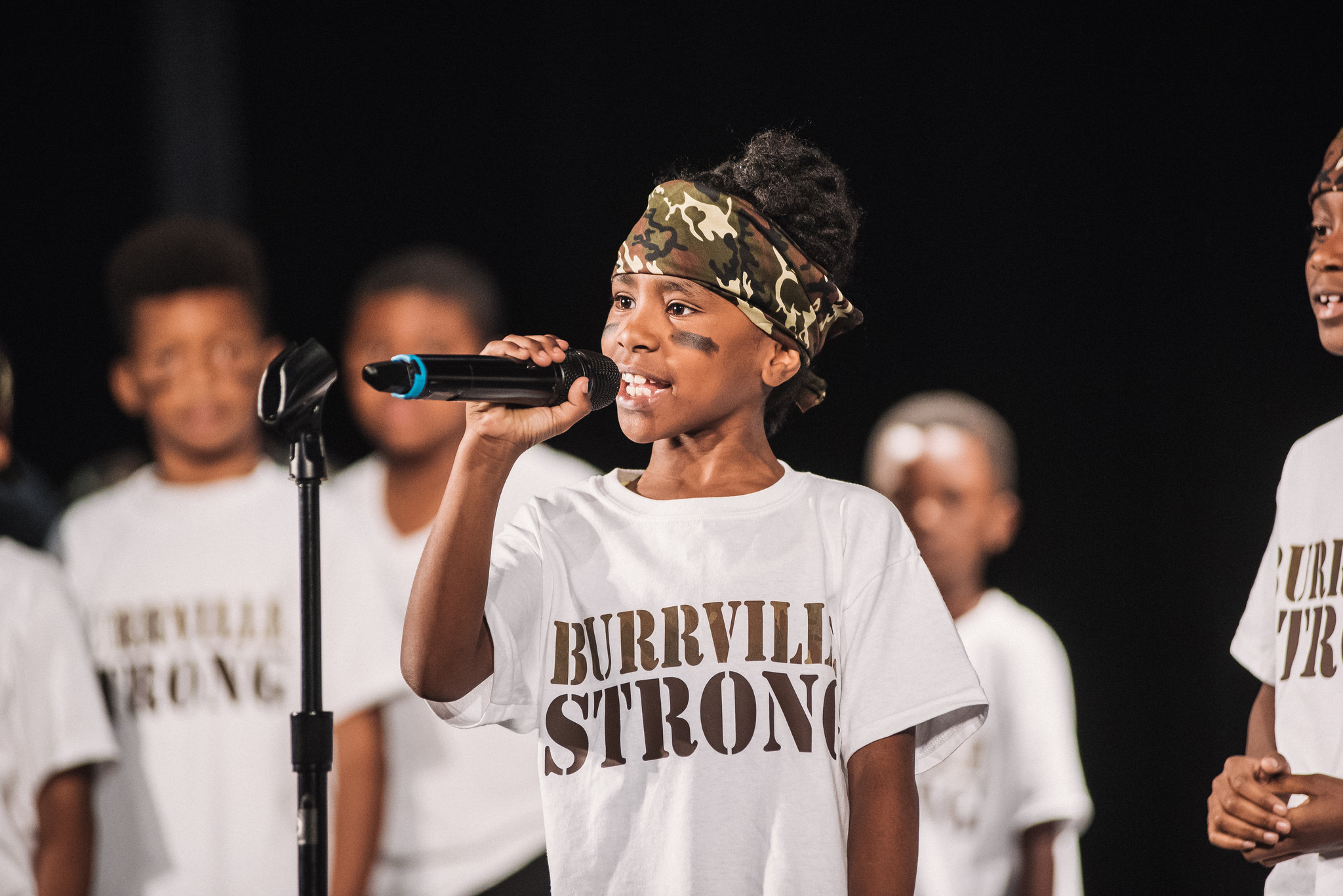
Tony: People get the soccer thing. It’s very visible, and there’s a huge soccer ball on our logo — but there’s also a pencil going through it. People don’t always know what that’s about. But we’re getting a lot better at showing them.
It happened to be a coincidence that one amazing teacher was interested in both soccer and poetry, and that’s how it all started. But the way it’s worked out, kids will build trust on the soccer field. They’re part of a team. So when they’re doing these poetry workshops, they’re able to be a little more vulnerable, a little more honest. They’ve got each other’s backs.
Charity: I remember meeting with our chief of staff, maybe two years ago, talking about how y’all got the soccer stuff down pat. Y’all have the partnerships, you’ve got the money flowing, everything was good. Y’all need to tighten up the poetry though.
In college I was very involved with the spoken word scene. I’ve been writing poetry my entire life. I now host at Busboys and Poets [a popular D.C.-area restaurant and bookstore that hosts spoken word poetry performances], and I’ve been up and down the east coast performing. So for DC SCORES I started bringing on artists that I’ve met throughout the city, locally, and nationally, and that really started to elevate the poetry aspect of the program. I think we’re going in a good direction.
Tony: To say the least. Every year our big, culminating poetry event is our citywide poetry slam. We usually do that in November, and it’s the biggest youth poetry slam in the region. It’s so big that we have to do it over two nights. Our kids are performing their original poetry in front of standing-room audiences at these slams.
Then the Our Words Our City program is the cream of the crop of the alumni and elementary and middle school poets. We put on a big event at Studio Theater where these kids perform, and so do the professional poets that they’ve been working with the whole time. They’re developing a rapport just like the kids who go to a million D.C. United games [D.C.’s professional soccer team] and have D.C. United players come to their events. They have an image of what the next level looks like for them, and we now have that on the poetry side.
Do you have any favorite stories?
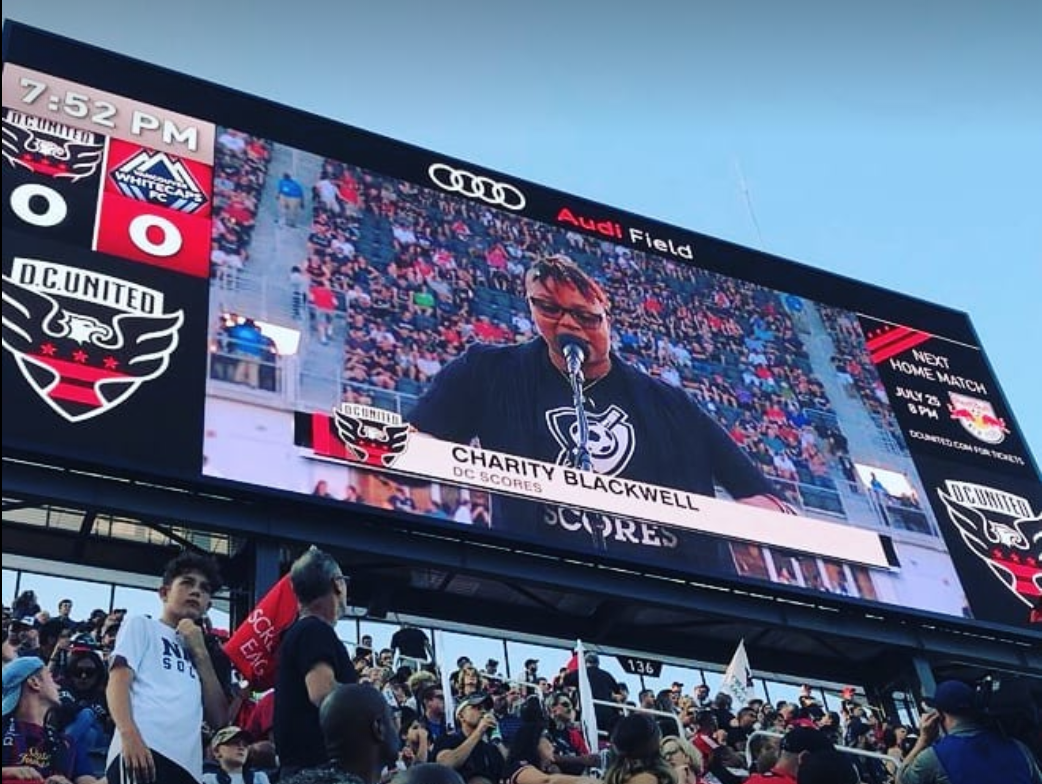
Charity Blackwell performs an original poem before kick-off at Audi Field’s opening match.
Tony: I come at this from the development/fundraising end, and I knew that Audi Field’s opening was huge for us from a partnership standpoint. When I say we’re D.C. United’s official community partner, I mean we are fully integrated. We are their community arm. The D.C. United relationship was going to be a big part of what we were doing.
I think maybe my second week on the job, United invited us to bring a poet to one of their corporate open houses for their new sponsors. So I’m thinking, “This is it. This is the first time they’ve really pulled us into the stadium prospecting point, and I know we’ve got to show value. Man, I hope this kid crushes it.” We had this kid Xavier come, and I think he was in seventh grade then. He had been a standout poet for us.
He shows up to this event, and right away you get the kid-in-a-suit vibe. Everyone kind of goes, “Aww.” When you walk into the sales center they have a little Fifa video gaming section and, true to form, the kid in the suit walks in and he goes “Ohh, FIFA,” and he wants to go and sit playing video games. And I’m thinking, “OK, that’s cute, but I really hope this kid gets it together!” I was a wreck.
Then it’s time for him to perform, and Dave Johnson — a D.C. local sports legend — is emceeing the event. You’ve got Dave Johnson about to pass the mic to Xavier, and you can tell there’s a change in Xavier’s demeanor. He’s ready to go. So Dave Johnson hands him the mic, and Xavier hands it right back. He said, “You don’t want to give me a mic; this room can’t handle that.” And he proceeds to absolutely light up this poem. I start looking at the crowd, and everyone has their phones out but not because they’re texting — they’re all videotaping him and they’re all just grinning from ear to ear. He absolutely slayed, and afterwards it was all anyone talked about.
I don’t coach. I go to the poetry slams and events and I see it, but this was a time where it sort of crossed over into my fundraising/development world, and it was amazing.
Charity: I have two stories, but they kind of merge together. Uniyah is one of my favorite poets from the program. We took her to a hearing recently — a celebration of the arts hearing in front of local council members.
We got there, and I could tell she was a little nervous because it was such a different crowd. It wasn’t a poetry slam, which was just parents and teachers and stuff; this was council members. It was pretty intense.
A couple of people went before us. There were some kids dancing, and other kids did some a cappella. And I say, “Look, you need to go up there and tear this up. Just like you did it at the poetry slam.”
So she’s this little tiny, timid girl —
Tony: Timid.
Charity: — timid-looking. So she comes up. She’s getting ready to go and start performing. And Councilman Grosso goes, “Wait, I want to talk to you!” So she’s answering questions with this sweet little voice, and I’m thinking, “Oh yeah, she’s settin’ ‘em up.” They think she’s going to do some little cutesy stuff. Then she did this poem that’s called “Bravery.” And the way she performed it, it was just so powerful.
By the end of the poem, she tells people to stand up. But she saw that nobody was standing. So she goes, “I said stand up!” Literally everybody in the crowd stood up — including the councilmembers.
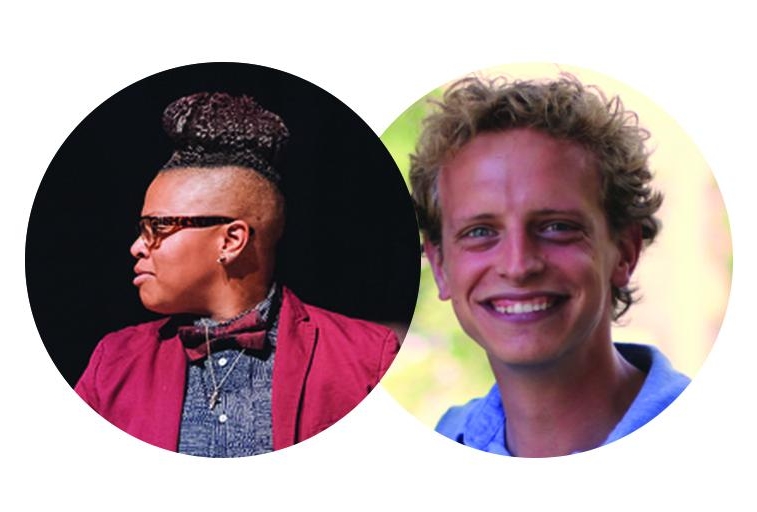 Charity Blackwell is the Director of Writing for DC SCORES, and Tony Francavilla serves as the Director of Individual Gifts & Corporate Partnerships. DC SCORES is the flagship for the national organization America SCORES, which serves 10,000 students across 12 cities. DC SCORES runs the only organized, free sports league in the D.C. public elementary schools, and the largest in the public middle schools. They also sent nine girls from the program to compete as part of the first ever Team USA at the Street Child World Cup in Moscow this summer.
Charity Blackwell is the Director of Writing for DC SCORES, and Tony Francavilla serves as the Director of Individual Gifts & Corporate Partnerships. DC SCORES is the flagship for the national organization America SCORES, which serves 10,000 students across 12 cities. DC SCORES runs the only organized, free sports league in the D.C. public elementary schools, and the largest in the public middle schools. They also sent nine girls from the program to compete as part of the first ever Team USA at the Street Child World Cup in Moscow this summer.
